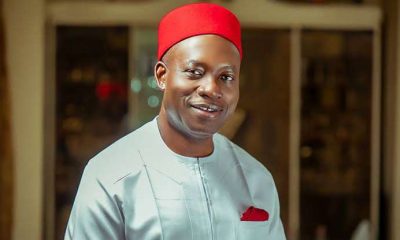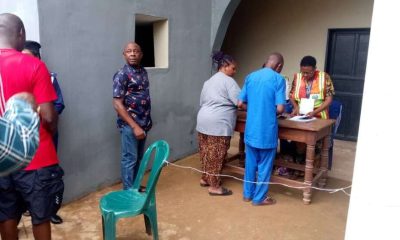Editorial
Gov. Soludo’s day in the Sun

Thursday March 17, 2022, marked a major milestone in the life of Prof. Charles Chukwuma Soludo, former governor of the Central Bank of Nigeria; the development quest of Anambra state, and the political aspirations of the Igbo nation. On this day, Soludo, having won the November 6, 2021 governorship election with a huge landslide, was inaugurated as governor.
Since coming into political limelight under former president Obasanjo’s administration, first as Chief Economic Adviser, and subsequently governor of the CBN, Soludo had shown like a thousand stars with his captivating eloquence and disarming brilliance. He had projected his fervent desire to set the country on the path to sustainable economic and social development, which has unfortunately continued to elude the national over time.
Soludo is Anambra state’s sixth governor since 1999, and perhaps, the most aspiring of collective hope by the state in particular and NdiIgbo generally. He is one candidate, for the first, not only in the state but the entire region, with a consensus approval of the people cutting across bbo best chance for the presidency.
He came to office prepared, unlike our common tradition, hit the ground running, and committed to a personal governance manifesto beside that of government, which demands subjection of power to the will and mandate of the people. His five point agenda for governance include security, industrial and technology hub, good governance, etc. Listening to him deliver the inauguration address raised the nostalgia of how leadership can change the course of history.
Soludo has big ideas for the state and the Southeast;, no doubt about that; the challenge now is to make them happen. He had said in the address: “Our contract with Anambra people derives from three seminal documents: (a) “Anambra Vision 2070—a 50-Year Development Plan” which I chaired the drafting; (b) “The Soludo Solution: A People’s Manifesto for a Greater Anambra”; and (c) “The Transition Committee (Combined) Report”—which built upon the first two.
“In sum, this is an agenda for an itinerant tribe in search of a livable and prosperous homeland. Driven by the philosophy of One Anambra, One People, One Agenda, our goal is to build Anambra into a livable and prosperous smart megacity. We aim to transit beyond petroleum into the digital world of the 4th Industrial Revolution, and envision Anambra as an industrial, technology, and leisure/entertainment hub of West Africa.
“Our detailed Plan rests on five key pillars: law and order (homeland peace and security); economic transformation as Nigeria’s next axis of industrial-tech and leisure; competitive and progressive social agenda (education, health, youth, women and vulnerable groups); Governance, rule of law and a rebirth of our value system; and aggressively tackling our existential threat posed by the environment—towards a clean, green, planned and sustainable cities, communities, and markets….”
This vision raises much hope for both Anambra and the region. His vision goes beyond the state and governance and challenges one of the most dysfunctional traits of Igbo politics; visionary leadership, which other people are now taking advantage of. Since the great Zik and his immediate successors, particularly after the war, Igbo have lost their sense of purpose and place in history. Everything about their world view seems to revolve around money.
This has largely constrained their influence in politics as they were ready for sale to the highest bidder. Mr. Peter Obi had great promised but his limited vision of leadership which focus on governance alone to the exclusion of politics vitiated his relevance. APGA, as a party is the only pan Igbo party in Nigeria founded to give the people a platform in national politics, as did AD which gave the Yoruba presidency in 1999.
But it has failed in the task to galvanize the Igbo for national leadership. Its inability to push beyond Anambra has reduced it to a state party rather a regional and national party, a money making venture for the few with access to it. The Igbo need good leadership and all eyes are on Soludo. Most likely, the presidency will still elude them because they have failed to organize and their voice and unity is in question.
Soludo must walk the talk and fill this yawning vacuum. Time for speeches is over. APGA must move beyond Anambra to other Igbo states. To do this, it must first reform itself to be more inclusive of others too. Otherwise, its future is in jeopardy. Soludo must provide Anambra with good governance; but he must also take the Igbo a step further into national politics. He must regain the momentum from where Dim Ojukwu left it. We are waiting.











